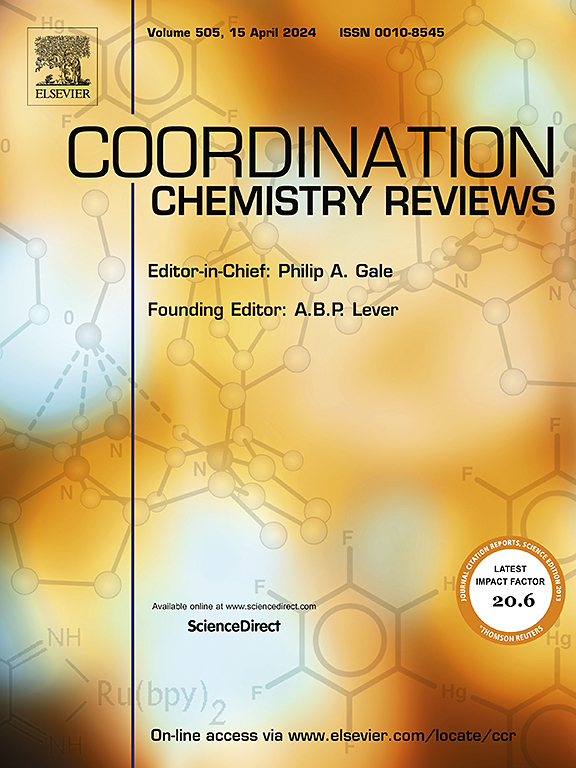Recent advancements in the multifaceted biomedical efficacy of triazole based metal complexes
IF 20.3
1区 化学
Q1 CHEMISTRY, INORGANIC & NUCLEAR
引用次数: 0
Abstract
In the last two decades, complexes of N-heterocycles especially of 1,2,3- and 1,2,4-triazoles have attracted the researcher's attention most due to their easier synthetic access and tremendous potential in several fields including catalysis, agricultural science, materials science, medicinal chemistry, photochemistry, etc. As triazoles played an important role in the modern era drug development but the discovery of their metal complexes with superior efficacy towards various diseases changed the course of medication development. Triazoles and their metal complexes were found to possess unique physicochemical properties important for rational drug designing. The high stability, easy synthesis, and ability to show various interactions with biological targets prompted the medicinal chemists to develop new triazole based metal complexes with better therapeutic efficacy and novel mode of action. In this review, we have summarized multifaceted biomedical efficacy of triazole based metal complexes in terms of their antimicrobial, antidiabetic, anticancer, antimalarial, antioxidant, anti-HIV, etc., activities. This comprehensive review will provide important insights into triazole based metal complexes and their most intriguing biological potential thereby stimulating future research for the development of lead molecules.

在过去的二十年里,N-杂环尤其是 1,2,3- 和 1,2,4- 三唑的络合物最吸引研究人员的注意,因为它们更容易合成,而且在催化、农业科学、材料科学、药物化学、光化学等多个领域具有巨大的潜力。三唑类化合物在现代药物开发中发挥了重要作用,但其金属配合物对各种疾病具有卓越疗效的发现改变了药物开发的进程。人们发现三唑类化合物及其金属配合物具有独特的理化性质,这对合理设计药物非常重要。三唑的高稳定性、易合成性以及与生物靶标发生各种相互作用的能力,促使药物化学家开发出疗效更好、作用方式新颖的三唑类金属复合物。在这篇综述中,我们从抗菌、抗糖尿病、抗癌、抗疟、抗氧化、抗艾滋病毒等方面总结了三唑类金属配合物的多方面生物医学功效。这篇全面的综述将为人们深入了解三唑类金属复合物及其最引人入胜的生物潜力提供重要的视角,从而促进未来先导分子的开发研究。
本文章由计算机程序翻译,如有差异,请以英文原文为准。
求助全文
约1分钟内获得全文
求助全文
来源期刊

Coordination Chemistry Reviews
化学-无机化学与核化学
CiteScore
34.30
自引率
5.30%
发文量
457
审稿时长
54 days
期刊介绍:
Coordination Chemistry Reviews offers rapid publication of review articles on current and significant topics in coordination chemistry, encompassing organometallic, supramolecular, theoretical, and bioinorganic chemistry. It also covers catalysis, materials chemistry, and metal-organic frameworks from a coordination chemistry perspective. Reviews summarize recent developments or discuss specific techniques, welcoming contributions from both established and emerging researchers.
The journal releases special issues on timely subjects, including those featuring contributions from specific regions or conferences. Occasional full-length book articles are also featured. Additionally, special volumes cover annual reviews of main group chemistry, transition metal group chemistry, and organometallic chemistry. These comprehensive reviews are vital resources for those engaged in coordination chemistry, further establishing Coordination Chemistry Reviews as a hub for insightful surveys in inorganic and physical inorganic chemistry.
 求助内容:
求助内容: 应助结果提醒方式:
应助结果提醒方式:


